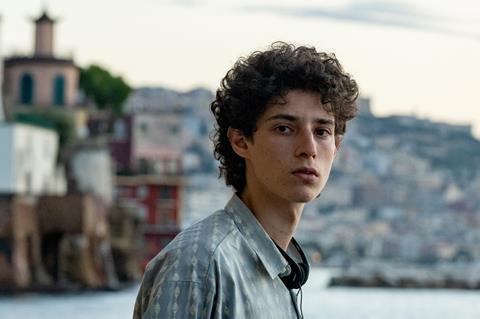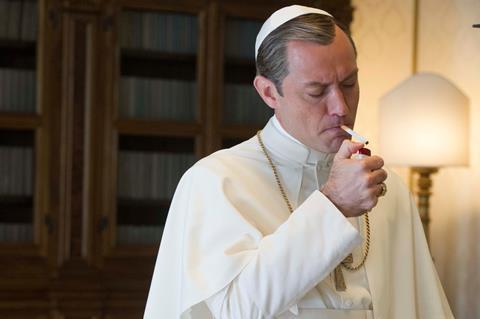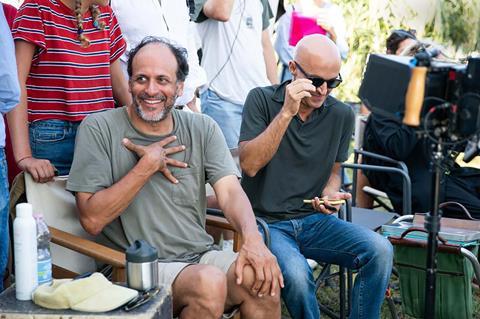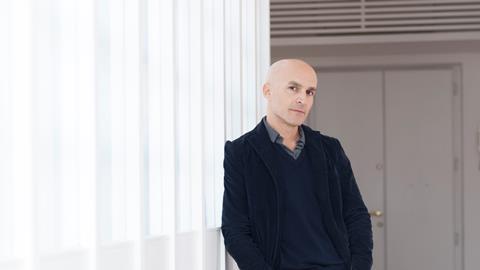Lorenzo Mieli has been a key figure in Italy’s high-end drama boom as the former co-head of Fremantle’s Rome-based film and TV production company Wildside, where he produced Paolo Sorrentino’s The Young Pope, Saverio Costanzo’s My Brilliant Friend and Luca Guadagnino’s We Are Who We Are.
In late 2019, he left Wildside to launch a new Fremantle-owned company, The Apartment, focused on the development of original feature films and high-end drama with global reach. Ironically, the arrival of the Covid-19 pandemic in spring 2020 saw Mieli confined to his own apartment for much of the company’s first year of activity.
Early productions to come down the pipeline nonetheless include Sorrentino’s Netflix-backed autobiographical feature The Hand Of God and rising fraternal directing duo Damiano and Fabio D’Innocenzo’s psychological thriller America Latina, which both had world premieres in Venice’s main competition this year.
Projects in post-production for a 2022 launch include the third season of My Brilliant Friend, directed this time by Daniele Luchetti; Marco Bellocchio’s drama series Esterno, Notte about the kidnap and assassination of Italian prime minister Aldo Moro in the 1970s; and Guadagnino’s Ohio-shot drama Bones & All, which reunites the filmmaker with his Call Me By Your Name star Timothée Chalamet.
The company’s development slate, which is largely under wraps for now, features the fourth and final season of My Brilliant Friend and the large-scale Italian-language bio-series M, about fascist dictator Benito Mussolini, which is slated to shoot at the end of 2022.
The creation of The Apartment is the latest chapter in the producer’s eclectic career, in which he has navigated the evolution of Italy’s TV landscape, from the duopoly of state broadcaster Rai and Silvio Berlusconi’s commercial network Mediaset across the 1990s and early 2000s, to the launch of Sky Italia by Rupert Murdoch in 2003 and the arrival of the streaming platforms, kicking off with Netflix in 2015.
It’s the 20th anniversary of the creation of your first production company, Wilder, in 2001. How do you feel when you look back over the past two decades?
It’s been a long, long journey. Wilder was named in tribute to Billy Wilder and while my company names have changed over the years, there has always been this wild thing in there, from Wilder, to Wildside, to The Apartment, which is an homage to his movie. I’ve enjoyed being able to do so many wide and different things, just like Billy Wilder.

You’ve produced documentaries, dramas, entertainment and fiction features. What are the roots of your eclectic career and content tastes?
I’ve always loved both cinema and television. I discovered a lot of cinema masterpieces on TV. That’s what my generation did as it was hard to find theatres screening great movies. I was obsessed with recording and cataloguing movies that were airing on TV, whether it was late at night or in the early morning. I would go from [Akira] Kurosawa to [Stanley] Kubrick to variety shows and popular dramas. Watching these movies in the stream of everything that was on TV in the late 1980s and early 1990s informed my taste.
A reboot of Wildside’s cult breakthrough TV drama Boris is underway at Disney+. Why was it so significant when you first launched that series in 2007?
Having cut our teeth making documentaries, Boris was our first attempt to do scripted. What had happened in the cable world in the US had a big personal impact. With the whole HBO thing, it was evident something was happening and there was a new form of high-end narration. The Sopranos changed my life. I remember watching it and thinking, “I want to do something like this but how do we get to that in Italy?” RaiUno and Canale 5, which dominated the TV drama scene at the time, were mainly producing soap-style dramas.
Sky Italia arrived in Italy and its Fox entertainment channel aired everything we loved from The Sopranos to Lost to Sex And The City. We went to Fox and asked if they would be interested in a show in Italian. They didn’t have the money but Emiliano Calemzuk [who was the Rome-based president for Europe of Fox International Channels at the time] decided to give us a chance. However, he could only offer us the interstitial space between one show and another, with three, four minutes per episode.
I wanted to make the point to audiences that we were doing something different. One of the first ideas we came up with was the idea of making a TV series mocking the way series were being made in Italy, going behind the scenes of the rubbish we didn’t like. It was a fun idea but also ambitious and risky because if you’re mocking something for being bad and running after an episode of Lost, it needs to be good. It took two, three years to find the right writers. I was introduced to three writers who hadn’t done much TV but had worked a lot in theatre and made one movie that was kind of weird but had exactly the kind of controversial irony I was looking for.
Boris would go on to run for three seasons, across 42 25-minute episodes, and was adapted as a feature. How did you get the commission expanded?
The writers delivered a first episode. It was great but it was 30 minutes. Fox liked it too but couldn’t give us a longer slot. I said I would shoot it anyway with whatever they could give us and I would get it down to five minutes. I was lying. I had no idea how I would get it to work. We shot a pilot on €6,000 [$6,900] in one day. I went back with the 30 minutes. They loved it and agreed to find a space. They didn’t have the budget so they used money earmarked for marketing and publicity to finance the first season. It never did big numbers on Fox but word of mouth grew and a lot of people watched it via illegal downloads and it gained a cool, cultish status. For us, it became a statement about how a different type of TV drama was possible in Italy.
Why have you decided to reboot Boris for Disney+?
A lot of people have asked us to revive the series over the years but Italian TV had moved on, and the object of the satire was no longer there in the same way. But the show landed on Netflix, re-sparking interest and we started to feel that what was happening with the streamers was so big, with its good and bad sides, that there would be plenty of things to say with irony and satire. It will follow our old crew, who are old school and always do everything in the worse possible way, as they deal with the world of the platforms, with their own special ways of doing things, rules and agendas.
Wilder merged with Offside to create Wildside in 2009. How did the deal come about?
I was approached by Fremantle to become CEO of Fremantle Italia. The company at the time was doing mainly entertainment shows and a soap opera called Un Posto Al Sole. I didn’t want to turn my back on scripted so I proposed the creation of Wildside, where I could keep certain projects that they weren’t interested in. I had known [Offside CEO] Mario Gianani for a while and our companies were very similar, even if he was more focused on auteurs and cinema. We were equal partners but always worked separately on our different projects.
Was it strange oscillating between high-end drama and shows like X-Factor Italia?
I was doing these things in parallel for years although I’m now focused on drama and film. Entertainment has been crucial to me. Producing The X-Factor was one of the most fun, energising and adrenaline experiences of my career. You’re basically doing live concerts every week.
You sold an initial 62.5% majority stake of Wildside to Fremantle in 2015. Why did you decide to give up your independence?
At a certain point, Fremantle CEO Cécile Frot-Coutaz, who is now head of Sky Studios, understood the scripted side of TV was growing very fast and the group started looking for companies involved in scripted. Cécile approached us and asked if we would be interested in Fremantle becoming shareholders. I was developing The Young Pope and the projects I was getting involved in were becoming bigger and bigger. Having a strong industrial and financial partner that understood us both strategically and economically, and wanted to help us to grow the business, made sense.

It’s great being independent but the incredible upside of being backed by a group like Fremantle is that, as well as being strong financially, its core business is development, owning IP, and being a studio for entertainment, movies and scripted. It’s also about the people. Fremantle COO Andrea Scrosati [recently also announced as CEO for continental Europe] is from the business; CEO Jennifer Mullin is a producer. The key issues for producers, whether they are independent or not, is ownership and creative lead, and they understand these conversations because they come from our world. Being part of Fremantle is immensely productive, efficient and strategic. It has been crucial for us.
The 2016 series The Young Pope was another breakthrough moment, as your first collaboration with Paolo Sorrentino and your first production with HBO as a partner.
I desperately wanted to work with Paolo. I thought he was, is, one of the greatest filmmakers in the world. I had gone to him with a different idea. The most successful shows to air either on Rai and Mediaset had been about Padre Pio [the controversial mystic monk and saint who died in 1968]. They were very conventional accounts while Padre Pio was such an interesting, complex and controversial, even grotesque character. I wanted to do the Paolo Sorrentino version of Padre Pio with Sky. It had all the ingredients to be a hit that would set the network apart. I went to Paolo with this idea, suggesting Toni Servillo for the lead. It was the second time I had approached Paolo. The first time was to see if he would be a judge on The X-Factor, but he turned me down. On Padre Pio, he liked the project but found it too risky for a number of reasons but while thinking about it he had come up with another idea, around the first American pope.
How did you get HBO on board as a partner alongside Sky Atlantic and Canal+?
Wildside was still independent at the time but that deal is probably what sealed Fremantle’s decision to invest. It started with a necessity. The show was very ambitious, expensive and we needed a partner. My dream forever was to work with HBO. We went with the whole package, Paolo had written all the scripts bar two, Jude Law was attached, Diane Keaton was attached. We were very tight in terms of the possibility of making the show happen. Paolo had just one slot and then he had to do another movie. I didn’t know anybody at HBO but Paolo was a door opener because he had just won the [foreign-language film] Oscar [with The Great Beauty].
We started a conversation with Michael Ellenberg, head of drama, and president Michael Lombardo, who have both since left. They immediately got into the project. It would be their first project produced in Italy. They were scared and we were very scared but I had to push for a yes or no, otherwise, the window of opportunity would have closed. Their ‘yes’ changed many things. As well as opening the door to HBO and further collaborations on My Brilliant Friend and We Are Who We Are, it also opened up the possibility of working more with the US market, which is an important but complicated market for European producers and auteurs to break into.
Sorrentino has said The New Pope series will be a trilogy. Is a final season on the cards, following the second season?
The real answer is that I completely don’t know. Paolo has a beautiful idea in mind but I don’t know if we will ever have the time or chance to make it happen.
How did your latest collaboration on the feature The Hand Of God, drawing on Sorrentino’s loss of his parents as a teenager, come about?
Everything has been a coup de theatre, starting with the script. I had no idea what it was about. I read it, it was the summer, and I was bowled over. It was so personal, so different from Paolo’s previous movies. It was a conscious change, a coup de theatre within his own movie career. He told me, “I’ve been thinking about this movie for 20 years and now I think I’m ready. Paolo had the idea to go to Netflix. Auteurs don’t normally want to work with platforms, but Paolo is not that kind of guy. He is the type of person who says, “This movie is perfect for Netflix.” This movie is a very intimate, delicate, precious journey and Paolo understood it needed a place that was safe but potentially super broad.
Luca Guadagnino also credits you with sowing the seeds for We Are Who We Are. Is that true?
I watched a documentary on YouTube, about a father with a gender-fluid young son. It was very interesting to me because it painted a picture of this incredibly powerful and explosive mix of adolescence and fluidity. I tried to pitch this idea to many people and then after Call Me By Your Name I thought I need to talk to [the film’s director] Luca Guadagnino. We pitched him the idea with the writers. He changed the idea again, like Paolo.

Is this how you like to work, testing ideas that morph into something else?
Going to filmmakers and writers that have their own agendas and ideas with your own good idea is a good way to start a conversation. It’s better than simply saying, “Have you got something interesting that you want to do?” A good idea starts the engine that creates a conversation — that is an essential part of the development process I love.
What are your longer term plans for The Apartment?
I created The Apartment because I want to move my business model away from being a physical producer to being more of a developer. What I love about my job as a producer is working with great filmmakers, great writers, sharing ideas with them and developing projects until the moment in which I think their movies or TV shows are at the point you really understand what they are.
The Apartment was born with the intention of providing a safe place for artists, talents, writers and directors to develop great projects, especially in this moment of craziness, with the changing of the market plus Covid-19. There is this rush to deliver and do more and more but I’m trying to take time and give time, which is very hard.
Are there plans to diversify the talents you work with?
I’m already doing that. I’m working with many women — directors, actress/directors, actress/executive producers and writers, especially. One of my favourite writers and showrunners is the Italian Francesca Manieri. I have a lot of projects with women in the works but I can’t talk about them yet. I obviously understand the question but I always try to follow the artistic necessity of a choice. Of course, the topic is hot right now but beyond the political debate, I feel there is a hunger, not from the audience, but from filmmakers and writers — there is a wave of ideas. There is a sense the world has opened a little bit. It’s beautiful how many great projects are coming from women writers and directors.
Most of the source material and talents you have worked with are from Italy. Do you have plans to work with talents and stories from outside the country?
That is a key strategic question for The Apartment. I am Italian, the whole team is Italian. Our roots, tastes and influences come from Italy and there will always be an essential core connection with Italy. But what I’ve been doing for the last year is developing projects that I simply find interesting or beautiful. I have a great bunch of projects with no connection to Italy, from Europe, America and South America. My goal is to add this new level of development and activity. Unfortunately, I can’t anticipate anything but there are four or five projects in the next 12 months that will be the next step and game changers.






![The Brightest SunScreen[Courtesy HKIFF]](https://d1nslcd7m2225b.cloudfront.net/Pictures/274x183/3/5/0/1448350_thebrightestsunscreencourtesyhkiff_312678.jpg)



















No comments yet